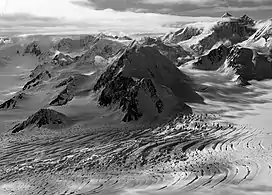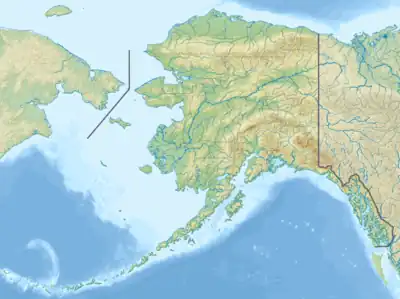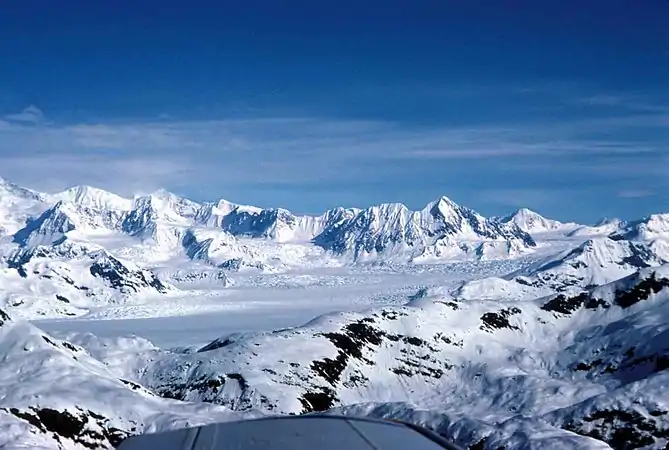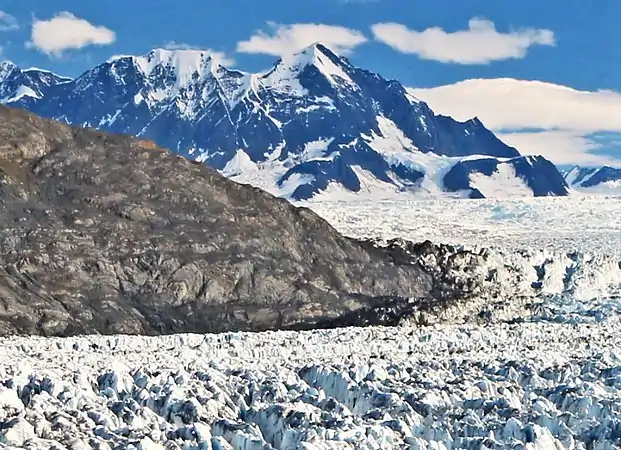| Pilot Peak | |
|---|---|
 Aerial view looking west Pilot centered, Einstein upper right | |
| Highest point | |
| Elevation | 8,670 ft (2,640 m)[1] |
| Prominence | 1,720 ft (520 m)[1] |
| Parent peak | Sharkstooth Mountain (8,710 ft)[1] |
| Isolation | 3.14 mi (5.05 km)[1] |
| Coordinates | 61°20′50″N 146°54′07″W / 61.34722°N 146.90194°W[2] |
| Geography | |
 Pilot Peak Location of Pilot Peak in Alaska | |
| Location | Chugach National Forest Valdez-Cordova Borough Alaska, United States |
| Parent range | Chugach Mountains |
| Topo map | USGS Valdez B-8 |
Pilot Peak is an 8,670-foot (2,643 m) elevation glaciated summit located 27 mi (43 km) northwest of Valdez in the Chugach Mountains of the U.S. state of Alaska. Set on land managed by Chugach National Forest, this remote peak is situated 6.5 mi (10 km) east of Mount Einstein, and 5.7 mi (9 km) southwest of Tazlina Tower.[2] The mountain was so named in 1955 by Lawrence E. Nielsen "because it is a very distinctive landmark that helped guide us back to camp in our explorations during 1955."[3] Nielsen was leader of the Chugach Mountains Expedition which was sponsored by the Arctic Institute of North America. This name was officially adopted by the U.S. Board on Geographic Names in 1965.[2]
Climate
Based on the Köppen climate classification, Pilot Peak is located in a subarctic climate zone with long, cold, snowy winters, and cool summers.[4] Weather systems coming off the Gulf of Alaska are forced upwards by the Chugach Mountains (orographic lift), causing heavy precipitation in the form of rainfall and snowfall. Temperatures can drop below −20 °C with wind chill factors below −30 °C. This climate supports the Columbia Glacier surrounding this mountain. The months May through June offer the most favorable weather for climbing.
See also
References
- 1 2 3 4 "Pilot Peak - 8,670' Alaska". listsofjohn.com. Retrieved 2020-03-31.
- 1 2 3 "Pilot Peak". Geographic Names Information System. United States Geological Survey, United States Department of the Interior. Retrieved 2020-03-31.
- ↑ Dictionary of Alaska Place Names, Donald J. Orth author, United States Government Printing Office (1967), page 756.
- ↑ Peel, M. C.; Finlayson, B. L.; McMahon, T. A. (2007). "Updated world map of the Köppen−Geiger climate classification". Hydrol. Earth Syst. Sci. 11. ISSN 1027-5606.
Gallery
.jpg.webp) Pilot Peak from Columbia Glacier
Pilot Peak from Columbia Glacier Pilot Peak right of center, south aspect
Pilot Peak right of center, south aspect
External links
- Weather: Pilot Peak